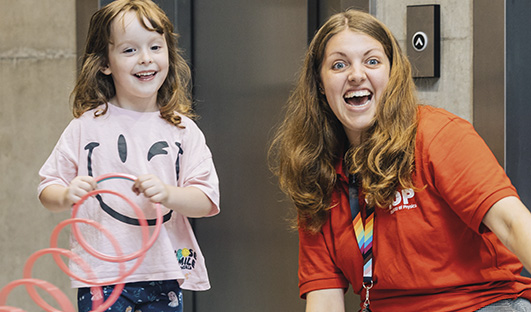We need a Limit Less generation

We live in a world facing a changing climate and a growing population with the need to decarbonise economies, improve healthcare and ensure water, food, and energy supplies. In Ireland, we need to create and develop the next generation of industries to provide high value jobs and improve productivity to safeguard citizens’ futures, writes Lee Reynolds, Head of Ireland and Northern Ireland at the Institute of Physics.
The science of physics will be crucial to all this work. However, on present trends these goals and opportunities are going to be missed. This is why the Institute of Physics (IOP) is campaigning to build a new Limit Less generation.
The number of people studying physics has seen long-term decline and falls far below what we know is needed now and in the future. The available data also tells us that physics has an inclusion problem. Limits and barriers are turning away talent that we need and must be removed if we are to secure the inclusive future we want and need.
Available data identifies that physics has under-representations of women, people from deprived communities, LGBT+, people with disabilities and some minority ethnic communities (especially Black Caribbean). The reasons for these are many – legacy of past exclusion, lack of role models, poorer quality teaching and perceptions of physics amongst teachers and parents impacting subject and career advice.
However, there are approaches that if adopted can have a significant impact. The IOP worked with six schools on the Whole School Equity Planning approach on how subjects and careers are represented and discussed with significant positive impacts upon the choices schoolchildren made. This work impacted across all subjects, not just physics, and is best embedded by designating a school governor responsible for inclusion. What it did demonstrate was that when the conversation is different so are the choices.
Third-level institutions can also help change the conversation. The University of Limerick physics department was the first to receive the Athena Swan Silver Award in Ireland. This is a quality charter mark framework and accreditation scheme that recognises and celebrates good practices in higher education and research institutions towards the advancement of gender equality. They launched a series of initiatives including extensive outreach activity to encourage female students to take physics as a Leaving Cert subject and study the subject at undergraduate level with now more than half of their under-graduates being female.
The IOP Limit Less campaign has been engaging with government and policy makers, delivering events, the new Eureka awards, working with education at all levels, partnering with social media influencers and developing Limit Less ambassadors all to reach under-represented groups.
It has produced an Irish careers booklet that shows the breadth and depth of opportunities and the diverse nature of people who study physics. Medicine, manufacturing, engineering, finance, IT, media, optics, construction, meteorology, and the arts is where physics led the role models it features. It aims to help students, teachers and careers advisers understand the Limit Less opportunities a choice of physics can unlock.
The demand and value are clear.
Despite preconceptions, the demand for physics spans all skills levels. High-skill-level roles are seeing the fastest growth – with the number of jobs for physical scientists, for example, growing by 40 per cent between 2010 and 2020 – more than half (53 per cent) of physics-demanding jobs do not require a degree.
Already there is significant unmet demand for physics skills, with a substantial number of physics-demanding roles at any one time – nearly 9,000 high-duration vacancies in mid-2021 – seeming to persist in being hard to fill.
There is strong, sustained growth in demand for physics skills, particularly outside of the scientific sector, with a significant proportion of hard-to-fill vacancies being for digital, and business and finance roles reflecting their importance, but is likely to exacerbate existing skills shortages in the coming years.
The role of physics-based industries (PBIs) is underappreciated as it comes under so many different names but includes advanced manufacturing, science and technology services, medical equipment servicing, energy sector, and telecoms. Whatever the enterprises are called, PBIs are a major and key contributor to Ireland and have the potential to do much more.
The IOP’s research into the impact of PBIs in Ireland shows they account for nearly 200,000 full-time employees. They contribute €29 billion to Ireland’s Gross Value Added (GVA) three times that of construction and represents 9 per cent of Ireland’s GDP. The annual turnover is worth £80 billion making it double the size of retail.

Despite preconceptions, the demand for physics spans all skills levels. High-skill-level roles are seeing the fastest growth – with the number of jobs for physical scientists, for example, growing by 40 per cent between 2010 and 2020 – more than half (53 per cent) of physics-demanding jobs do not require a degree.
Despite contributing just under 9 per cent of national GVA, PBI investment in research and development (R&D) comprises more than 40 per cent of total R&D in Ireland. As many economies wrestle with a productivity challenge, the Physics sector is above the Irish average. As a sector, it provides high value jobs with average employee compensation of €59,000.
In the past decade, Irish PBIs achieved 33 per cent in GVA growth, 41 per cent employment growth and 26 per cent turnover growth. With 92 per cent of the 19,994 physics-based companies being micro-sized (less than 10 employees) the opportunities for more growth, better jobs and higher productivity are there to be taken.
There is a clear base of high value and track record of success to be built upon.
There is no time in human history where rapid scientific innovation was needed more to deliver the future we need and want.
To do all that we need to break down outdated stereotypes, remove the barriers and tap into the talents of all parts of our society. We need to build the Limit Less generation.

E: lee.reynolds@iop.org
W: www.iop.org





